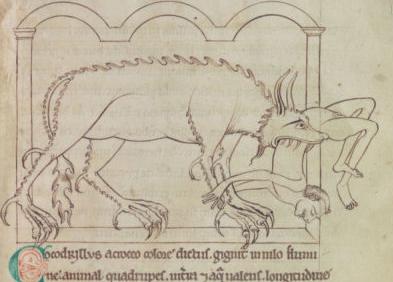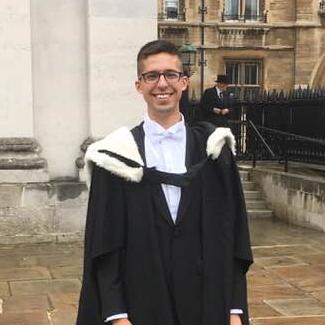MPhil in Medieval History

Overview
Cambridge University is a uniquely rich place to be a medievalist. The university is over 800 years old, with a wealth of medieval buildings and traditions, as well as countless manuscripts and early printed books held by our many libraries. Across the university, there is a strong concentration of scholars of the middle ages not only in History but also in related faculties, such as Asian and Middle Eastern Studies, Archaeology, Art History, Medieval Languages and within the museums and libraries of Cambridge. The MPhil in Medieval History forms an integral part of the teaching and research here at the History Faculty (widely regarded as one of the best in the world). The course provides students with intensive training in concepts and methods of medieval history, as well as skills in Latin and Palaeography, to help them become innovative, cutting-edge scholars.
At a glance
The MPhil in Medieval History is a taught postgraduate course with a substantial research component, which runs for nine months covering the three terms (Michaelmas, Lent and Easter) of the Cambridge academic year. It is designed both for students who want to enhance their understanding of the Middle Ages and for those who want to go on to complete further primary research at PhD level. It provides experience with a broad range of ways to analyse the medieval past as well as intensive research training. Students on the MPhil will join a community of researchers across the field of medieval history, and integrate with the rich research culture of medieval studies across the university.
If you have any questions, drop us a line on medieval@hist.cam.ac.uk

The Course
Course Outline and Schedule
The course is designed for those who have completed degrees in which History is the main or at least a substantial component and who want to consolidate their knowledge of medieval history. It is particularly appropriate for those who may wish to continue on to a PhD, at Cambridge or elsewhere. It is also well-suited to those who seek simply to explore medieval history at a deeper level, building independent research skills.
Students will be provided with an in-depth study of some of the key areas of research in medieval history as well as the historiographical knowledge and the analytical and technical skills to support work in their chosen field. All students will have a supervisor who will guide them through the requirements of the course and, most crucially, the dissertation.
In this manner, all students are provided with the historiographical knowledge and analytical skills necessary to understand and evaluate both medieval sources and existing research and to pursue research in their own fields of intellectual interest. Through individual supervisions and classes, students are introduced to the more specialised and intensive nature of research required at a postgraduate level.
The MPhil involves 3 assessed components:
- two core courses (16 x 2 hour classes each option, 4 hours per week) each course worth 10% of the overall mark;
- one option course chosen from a list offered by the Faculty (8 x 2 hour classes) worth 10% of the overall mark;
- a dissertation (15,000 – 20,000 words) worth 70% of the overall mark.
In addition to the above, students will attend the weekly Medieval History research seminars and workshops.
Students may also take optional skills modules in Greek or Latin and may choose to audit additional option courses. These are not assessed elements of the MPhil but will help students develop the skills needed for the MPhil in Medieval History.
Note on Start Dates
Whilst the course will officially start in October, all students will be required to attend an intensive Latin course before the MPhil commences. This will begin usually in the third week of September.
Core Course: Latin & Palaeography
'Pre-Sessional' Intensive Latin
All candidates for the Cambridge MPhil in Medieval History are expected to have a “basic understanding of Latin grammar and the ability to translate straightforward Latin texts” by the start of the course in October. All candidates who have no Latin, or Latin that does not reach this standard, are required to attend the preliminary intensive three week course in Latin immediately before the beginning of the academic year.
Many Cambridge Colleges are able to provide accommodation for students for the duration of this course.
At the end of the three-week course all students will sit an examination to test their Latin skills. Students who have not taken the pre-sessional course for any reason will also be required to sit this test.
Latin Classes
Following on from the pre-sessional Latin course in September, Dr Jacob Currie teaches three Latin reading classes during term. Each takes place once per week for 20 weeks (Michaelmas, Lent and the first half of Easter Term).
- Late-antique and early-medieval Latin
- High-medieval Latin
- Late-medieval and renaissance Latin
Each class will read Latin texts in digitised manuscript form. Students may choose the class (or classes) whose chronological range best matches their interests.
There is no formal assessment for the Latin component of the course.
Palaeography
For palaeography, students take one of the following: Palaeography I (covering the period c. 500-1150 AD) or Palaeography II (covering the period c. 1000-1500 AD). Each is taught by a weekly one-hour lecture followed by a one-hour transcription class. Students attend the strand (I or II) that best fits the chronological focus of their dissertation topic.
The lectures will provide students with a historically contextualised survey of script and scribal conventions in western European books and documents of the earlier and later middle ages, respectively, and an introduction to the methodological issues involved in analysing handwriting and dating and localising written artefacts on the basis of their script.
The classes focus upon the practical skills of transcription: identifying the letter-forms and scribal conventions of punctuation and abbreviation in books and documents, and transcribing according to modern scholarly conventions. Additional practice in transcription will be provided each week as homework.
Core Course: Concepts and Methods
This course involves discussion and analysis of different approaches, sources, debates and ideas in the study of Medieval History. The course aims to provide all students with key higher-level skills, and to prompt the exploration of a wider historiographical area pertaining to a student’s chosen dissertation topic.
Seminar topics for 2023-24:
- Introduction: Sources and the Challenges of Medieval History
- Critical editions and textual criticism
- Social structures
- State and Nation in the Middle Ages
- Ritual and symbolic communication
- Economic systems
- Saints, Scepticism and Belief
- Writing Medieval History
Medieval History: Concepts and Methods
- Teaching: weekly seminars
- Assessment: essay (c. 4,000 words)
Palaeography
- Teaching: weekly lecture & transcription class
- Assessment: examination
Latin
- Beginner course from mid-September to the start of term
- Teaching: weekly classes
- Assessment: examined jointly with Palaeography
Applying to the course
To apply to the MPhil in Medieval History, you will need to consult the relevant pages on the Postgraduate Admissions website (click below).
Since applications are considered on a rolling basis, you are strongly advised to apply as early in the cycle as possible.
On the Postgraduate Admissions website, you will find an overview of the course structure and requirements, a funding calculator and a link to the online Applicant Portal. Your application will need to include two academic references, a transcript, a CV/ resume, evidence of competence in English, a personal development questionnaire, two samples of work and a research proposal.
Research proposals are 600–1,000 words in length and should include the following: a simple and descriptive title for the proposed research; a rationale for the research; a brief historiographic context; and an indication of the sources likely to be used. The document should be entitled ‘Statement of Intended Research’. Applicants are encouraged to nominate a preferred supervisor, and are invited to contact members of the Faculty in advance of submitting their application to discuss their project (see our Academic Directory: https://www.hist.cam.ac.uk/directory/academic-staff).
Below are some anonymised examples of research proposals, submitted by successful applicants to the MPhil in Medieval History. You may use these to inform the structure of your submission. Please note that they are purely for guidance and not a strict representation of what is required.
Medieval History - Research Proposal 1
Medieval History - Research Proposal 2
Assessment & Dissertation
Thesis
The dissertation is Part II of the MPhil in Medieval History.
All students will submit a dissertation of 15,000-20,000 words, worth 70% of the overall mark.
At the discretion of the Examiners the examination may include an oral examination on the thesis and on the general field of knowledge within which it falls.
Essays
For the core module Medieval History: Concepts and Methods students will prepare a historiographical and bibliographical essay preparatory to the dissertation. Students will meet with their supervisor to discuss the essay and get feedback in preparation for the dissertation.
For the optional module students will submit a 3,000-4,000 words essay (or equivalent).
Each will count toward 10% of the final degree mark, for a total of 20%. Taken together with the written examination in Latin and Palaeography, these are Part I, and students must achieve pass marks in order to move to Part II.
Written examination
Students will sit one exam in Latin and Palaeography Transcription worth 10% of the overall mark for the MPhil.
Practical assessment
All students will present their work at least once during the academic year and will receive feedback from academics and peers on their work-in-progress. This is not an assessed element of the course but is a valuable feedback tool for the dissertation.
The Dissertation, or thesis, is the largest element of the course.
Students are admitted to the University on the basis of the research proposal, and each student will be assigned a Supervisor who will support the preparation of a piece of original academic research. Candidates must demonstrate that they can present a coherent historical argument based upon a secure knowledge and understanding of primary sources, and they will be expected to place their research findings within the existing historiography of the field within which their subject lies.
All students should be warned that thesis supervisors are concerned to advise students in their studies, not to direct them. Students must accept responsibility for their own research activity and candidacy for a degree. Postgraduate work demands a high degree of self-discipline and organisation. Students are expected to take full responsibility for producing the required course work and thesis to the deadlines specified under the timetable for submission.
Banner image: Crocodrillus from Bestiary (MS Ii.4.26) UL collection
